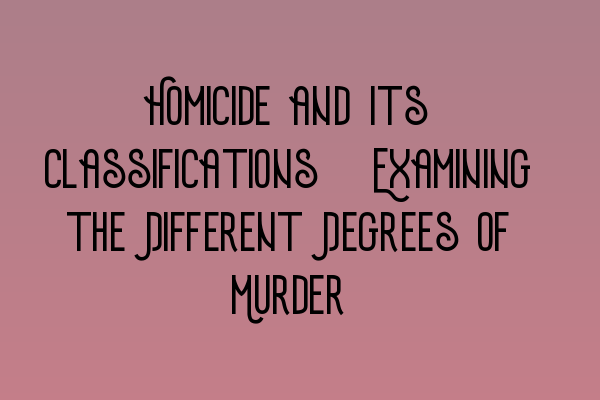Homicide and Its Classifications: Examining the Different Degrees of Murder
Homicide is a serious crime that involves the unlawful killing of another person. It is a complex area of criminal law that requires an in-depth understanding of the different degrees of murder. In this article, we will explore and analyze the various classifications of homicide and shed light on their legal implications.
First Degree Murder
First degree murder is the most severe form of homicide. It refers to a killing that is premeditated and deliberate. This means that the perpetrator planned and intended to cause the victim’s death. Additionally, it may involve murders committed during the commission of certain felony offenses, such as arson, rape, or robbery. First degree murder carries the harshest penalties, including life imprisonment or even the death penalty.
If you want to test your knowledge on homicide and criminal law, check out our SQE 1 Practice Exam Questions.
Second Degree Murder
Second degree murder, also known as non-premeditated murder, is a killing that lacks the element of premeditation. Unlike first degree murder, it doesn’t involve a planned or deliberate act. Instead, it is often characterized by an intention to cause serious bodily harm or engage in conduct that clearly endangers the lives of others. While second degree murder is still a serious offense, the penalties are generally less severe compared to first degree murder.
For comprehensive preparation materials and practice mocks for the SQE 1 exam, take a look at our SQE 1 Practice Mocks FLK1 FLK2.
Voluntary Manslaughter
Voluntary manslaughter refers to a killing that occurs as a result of provocation or heat of passion. It involves intentional killing but is committed under circumstances that reduce the moral culpability of the perpetrator. For example, if a person acts in the heat of the moment due to extreme rage or fear, resulting in a death, it may be considered voluntary manslaughter. The penalties for voluntary manslaughter are usually less severe than those for murder.
If you’re preparing for the SQE 2 exam, take advantage of our specialized SQE 2 Preparation Courses.
Involuntary Manslaughter
Involuntary manslaughter refers to an unintended killing that occurs as a result of reckless or negligent behavior. Unlike voluntary manslaughter, there is no intent to cause harm or kill another person. Involuntary manslaughter is often associated with acts of negligence or carelessness that result in someone’s death. The penalties for involuntary manslaughter vary depending on the circumstances of the case.
If you’re looking for reliable SQE 1 preparation courses, we’ve got you covered. Check out our range of comprehensive SQE 1 Preparation Courses.
Keep informed about the latest SRA SQE exam dates by visiting our website for updates on SRA SQE Exam Dates.
In conclusion, understanding the different degrees of murder is crucial in criminal law. Whether it’s first degree murder, second degree murder, voluntary manslaughter, or involuntary manslaughter, each classification carries unique legal implications. If you’re interested in furthering your knowledge in criminal law or preparing for the SQE exams, explore our range of comprehensive preparation materials, practice exams, and courses.
Disclaimer: This article is for informational purposes only and should not be construed as legal advice. Consult with a qualified solicitor for professional guidance regarding homicide cases.
